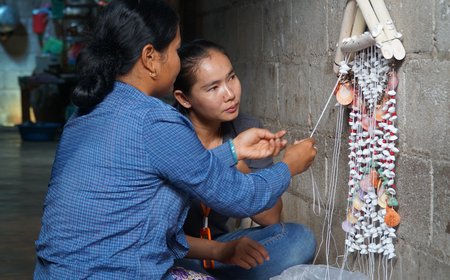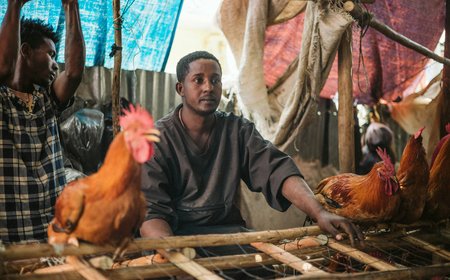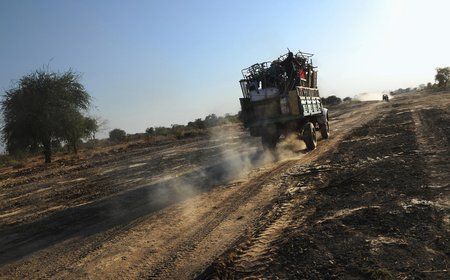This article was first published by AfricLaw, a joint venture of the Institute for International and Comparative Law in Africa (ICLA) and the Centre for Human Rights (CHR) of the Faculty of Law, University of Pretoria. The article was written by Azwi Netshikulwe and Tsholofelo Nakedi. Find the original article here.
In recent years, the election period in South Africa has been a sensitive time, and it has, in some instances, exacerbated issues related to xenophobia and negatively impacted social cohesion within communities. This takes place within the context of a country like South Africa that has struggled with a culture of violence, which has its historical roots stemming from colonial and apartheid politics of divide and rule. Consequently, issues related to identity, race, and nationality often surface during election periods, leading to tensions and potential outbreaks of xenophobia. For example, political parties sometimes use divisive language and scapegoating tactics to rally their base and gain electoral advantage. In most cases, this political discourse includes blaming foreigners for unemployment, crime, or other social problems, which can stoke xenophobic sentiments among the South African populace. This is exemplified by the use of xenophobic rhetoric in certain party manifestos, where leaders prioritise addressing illegal migration.
In South Africa, migration remains a multifaceted issue owing to persistent socioeconomic disparities and ongoing regional instability, leading to significant migration from various African nations. On the other hand, the migration of Africans in the last three decades was met with a lack of integration systems to foster integration and social cohesion with locals. Consequently, some South Africans, especially those who live in marginalised communities, struggle to live harmoniously with other African migrants. Many factors contribute to this disharmony, and one of them is the competition for scarce resources among community members, especially for those who live in the margins of urban settings. Additionally, the rise of social media has provided a platform for the rapid spread of misinformation and hate speech. False narratives about foreigners stealing jobs, committing crimes, or exploiting social services are also attributed to fueling xenophobic attitudes and behaviours. Feeding into this attitude is that most African migrants live in poor communities, unlike migrants from other parts of the world, such as Europeans, who do not experience anti-migrant sentiments and attitudes or attacks because they live in affluent areas.
These anti-migrant narratives are spread without considering some positive relationships that exist within the local and migrant communities. For example, migrants, especially those running businesses, engage in some Corporate Social Responsibilities (CSRs) or charitable activities to assist locals in difficult situations, such as planning funerals. During the COVID-19 pandemic, some African migrants in various communities collected money amongst themselves and bought groceries for needy households in South Africa. During our community work in Knysna, it was found that African migrants collected R100 000 to buy groceries during that period, which signifies positive and socially cohesive relationships. Unfortunately, these are some of the stories that are not told in the public domain. Within this context, leaders of society, particularly politicians who are gunning for votes, use divisive narratives and other actions that undermine the peaceful coexistence of locals and effectively stoke conflicts between these groups.
In Gqeberha, community structures create platforms for dialogue and implement programmes to foster relationships between migrants and locals. If social unrest is in another place and likely to spill into their communities, leaders can mobilise the community to prevent such acts. In addition, migrants in this community work as a collective regardless of their nationalities and have elected leaders to represent their voices in broader community structures.
In Motherwell, several communities and community policing forum (CPF) members said they communicate very well with one another, and people get together to deal with issues affecting them, especially on the street level. For example, community members say they get together to prevent criminal activity in the street or shop towards a local or foreign national. In the long run, these acts and interactions enhanced social cohesion between locals and migrants.
As we celebrate 30 years of democracy, we must reflect on where we come from as a country and ensure that post-apartheid politics and state policy should focus on unity and community-based reconciliation; we must reimagine a more cohesive country in which migrants and locals can live together in Harmony. Politicians have a crucial role in society, especially in building a peaceful society that includes every person living in the country regardless of gender, nationality, and race. Political leaders should avoid divisive and inflammatory rhetoric and instead focus on policies and strategies promoting inclusivity, tolerance, and unity. Civil society organisations, media outlets, and technology companies should work together to combat the spread of misinformation and hate speech on social media platforms and other online forums.
Furthermore, efforts should be made to strengthen democratic institutions, promote good governance, and ensure that the government is responsive to the needs of all its citizens, regardless of their nationality or background. Moreover, community-based initiatives that bring together people from diverse backgrounds can help foster understanding, empathy, and mutual respect among community members. By addressing these underlying issues and promoting positive engagement and dialogue, South Africa can work towards building a more cohesive and inclusive society, particularly during the sensitive period of elections.



